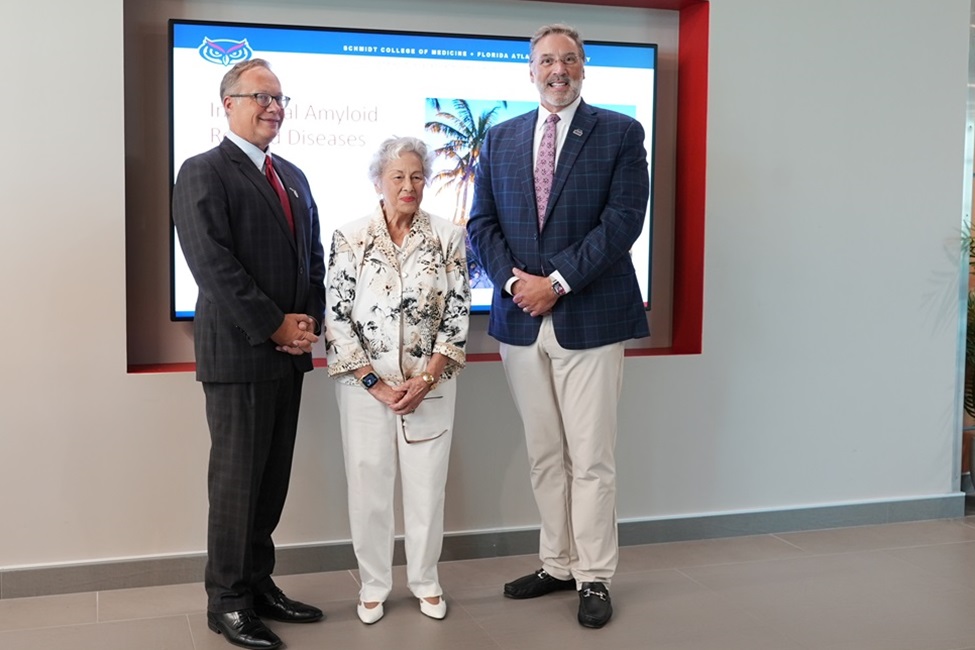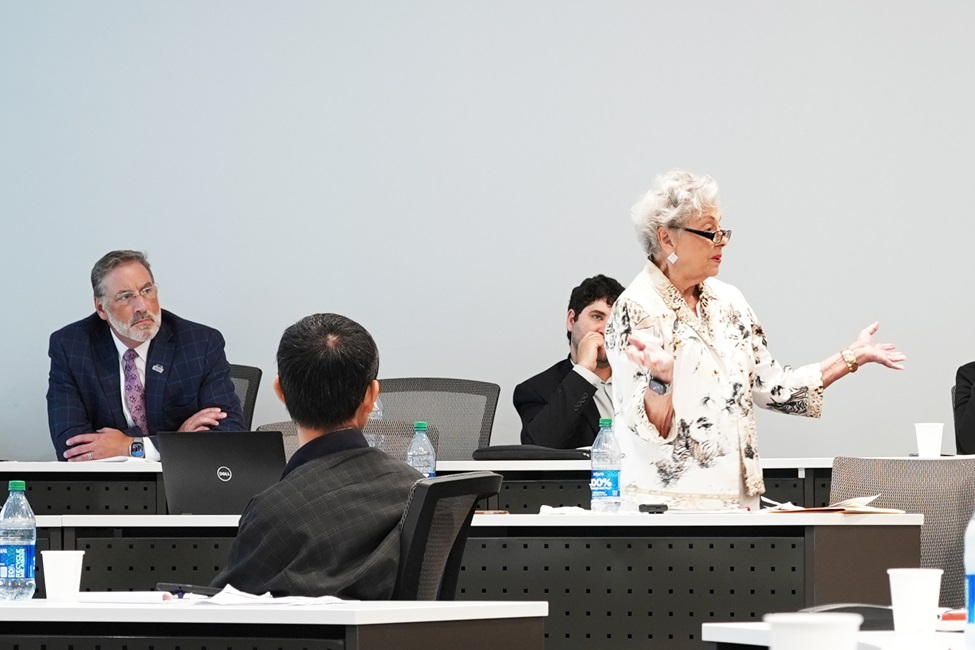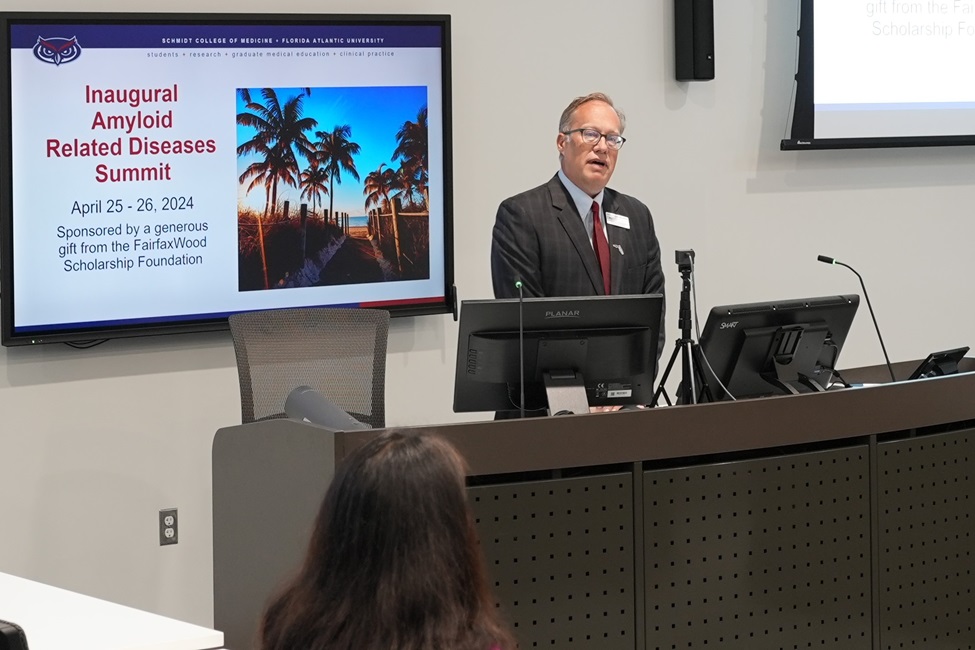
(From left): Michael R. Dobbs, M.D.; Ann Wood; and Curtis Whitehair, M.D., interim dean, FAU Charles E. Schmidt College of Medicine.
Florida Atlantic University’s Schmidt College of Medicine recently hosted the inaugural “Amyloid Related Diseases Summit,” which brought together leading scientists in the field across North America and Europe to discuss the latest research and advancements in the study of amyloid-related diseases.
Amyloid proteins cause life-threatening diseases that can be present throughout the body, including the heart, kidneys, liver and brain. The most common localized form of amyloidosis is in the brain. Cerebral amyloidosis, when symptomatic, usually manifests in one of two ways: in Alzheimer’s disease and related dementias and in stroke. Treatments are very limited and there are no cures.
Because amyloid does not affect just one organ, unraveling the underlying cause of amyloid fibril creation – a hallmark of this disease – is complex and challenging.
In 2023, Boca Raton philanthropists Ann and the late John Wood of the FairfaxWood Scholarship Foundation, gave a transformational gift of $11.5M to the College of Medicine in support of amyloidosis research. This gift established the FairfaxWood Health & Innovation Technology Initiative, the FAU Amyloidosis Project, and the endowed FairfaxWood Chair of Clinical Neurosciences. Today, the FairfaxWood Health & Innovation Technology Initiative is changing the way researchers and clinicians study and treat amyloidosis and other serious medical conditions that require a synergistic approach to improve health and quality of life.
“Amyloidosis is an awful disease that deserves to be thoroughly researched to get results and to eliminate it,” said Ann Wood. “Our family was affected directly, my husband, John Wood, hence, we are trying to make a difference by establishing and funding this inaugural summit that took place in April at Florida Atlantic University. Dr. Dobbs and his staff put much effort into this event, which was a great success. Many excellent ideas appeared to be fermenting from the various summit participants – all in the right direction – and we are hopeful for future great successes on this blood ailment and quickly. Perhaps even next year!”
The $11.5M gift marked the Wood’s fourth contribution to FAU’s College of Medicine and followed a $28 million scholarship gift in 2022, in memory of their son Robert A. Wood, to support medical education and to create the opportunity for debt-free tuition for aspiring physicians.
“To date, there are dozens of amyloid-protein related diseases, neurological disorders as well as cardiac, nerve and kidney diseases. There also are millions of people suffering from these diseases with the common thread of amyloid protein deposition,” said Michael R. Dobbs, M.D., the first endowed FairfaxWood Chair of Clinical Neurosciences, chair and professor of the Clinical Neurosciences Department and associate dean of clinical affairs within FAU’s Schmidt College of Medicine. “Our inaugural summit was the start of an important and timely conversation to bridge the gap between amyloid research and clinical practice.”
The two-day summit program included the following presentations:
- “Mechanistic Insights into Protein Amyloidogenesis” – Deguo Du, Ph.D., professor, Department of Chemistry and Biochemistry, FAU Charles E. Schmidt College of Science
- “Role of Lipids on Amyloid Aggregation” – Ayyalusamy Ramamoorthy, Ph.D., a professor of chemical and biomedical engineering, molecular biophysics and neuroscience in the College of Engineering at Florida A&M University-Florida State University
- “Amyloid Beta Glycation Leads to Neuronal Mitochondrial Dysfunction and Alzheimer’s Pathogenesis Via VCAC1-dependent mtDNA Efflux” – Donghui Zhu, Ph.D., distinguished scholar and SUNY Empire Innovation Professor in the Department of Biomedical Engineering, Institute for Engineering-Driven Medicine, Center of Healthy Aging, and Neuroscience Program at SUNY-Stony Brook University
- “From Amyloid to Toxic Proteins that Shape the Future Therapeutic Landscape” – Corinne Lasmezas, Ph.D., DVM, professor of clinical neuroscience, FAU Schmidt College of Medicine and director of the David and Lynn Nicholson Center for Neurodegenerative Disease Research within the FAU Stiles-Nicholson Brain Institute
- “Urchin-like Hollow Nanozyme for Potential Application in Alzheimer’s Disease” – Kevin Yunqing Kang, Ph.D., an associate professor, Department of Ocean and Mechanical Engineering, FAU College of Engineering and Computer Science
- “Modulating Amyloid Aggregation with Chemical Tools” – Praveen Rao Perampalli Nekkar, Ph.D., a tenured associate professor at the School of Pharmacy, University of Waterloo, Canada
- “Insights into α-Synuclein Amyloid Formation: Effect on N- and C-terminal Truncations at the Residue-level” – Jennifer C. Lee, Ph.D., senior investigator in the Intramural Research Program at the National Heart, Lung, and Blood Institute of the National Institutes of Health
- “Predicting Risk of Amyloidoses by Reading Genomes” – Andrey Kajava, Ph.D., director of research at the Centre National de la Recherche Scientifique in France and head of the Structural Bioinformatics and Molecular Modeling group at the Centre de Recherche de Biologie cellulaire de Montpellier
- “Experimental Approaches to study Aggregation of Amyloidogenic Proteins and Compounds that Prevent this Process” – Andrew Oleinikov, Ph.D., a professor of biomedical science, FAU Schmidt College of Medicine
- “Translating Structural Biology into Rationally-designed Vaccines for Neurodegenerative Diseases” – Holger Wille, Ph.D., a professor of biochemistry at the University of Alberta and director of the Centre for Prions and Protein Folding Diseases
“This was truly an extraordinary gathering of multidisciplinary scientists, researchers and clinicians who share a common mission to combat amyloidosis,” said Dobbs. “We are incredibly grateful to Ann Wood for her participation at this summit and for making this event possible. Plans are already underway for our annual summit next year, which will focus on the brain-heart connection in amyloid related disease.”


-FAU-






